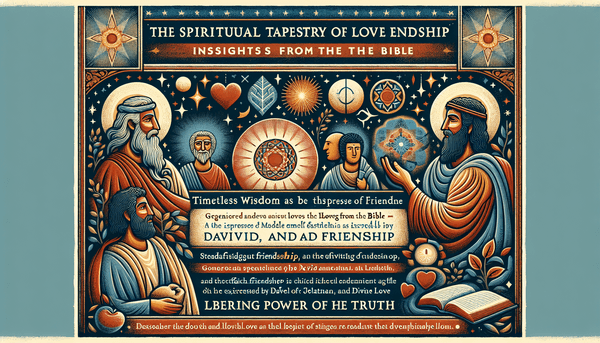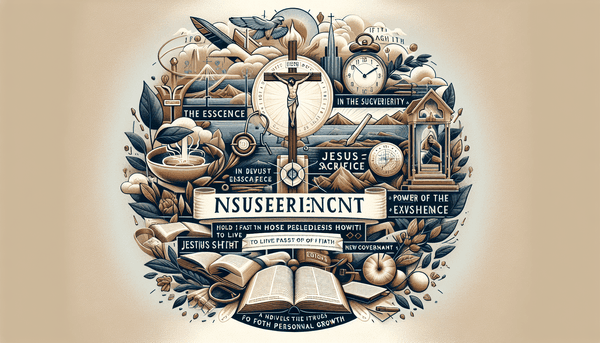The Essence of Biblical Friendship
The bond between David and Jonathan stands as a powerful illustration of friendship in the Bible. 'After David had finished talking with Saul, Jonathan became one in spirit with David, and he loved him as himself' (1 Samuel 18:1). This profound connection is built on loyalty, integrity, and a mutual commitment that endures through both prosperity and adversity. Proverbs 17:17 reinforces this by stating, 'A friend loves at all times, and a brother is born for a time of adversity.' Such friendships not only provide companionship but also foster personal and spiritual growth, as 'As iron sharpens iron, so one person sharpens another' (Proverbs 27:17). In the New Testament, Jesus expands the concept of friendship to a spiritual brotherhood among believers, offering the ultimate model of friendship based on love and sacrifice (John 15:13-15). To cultivate such deep connections, we must strive to embody love, loyalty, honesty, and selflessness, and actively engage in communities where these virtues flourish.
The Search for Love in Light of Scripture
The nature of love in the context of the Bible is beautifully depicted in 1 Corinthians 13:4-7, where love is described as patient, kind, and selfless. To find such love, one must first embody these qualities, acknowledging that 'Love your neighbor as yourself' (Matthew 22:39) is not only a command but also a pathway to finding love. Proverbs 18:24 suggests that to have friends, and by extension love, one must be friendly, indicating that the search for love involves building sincere relationships and nurturing one's character. Trusting in God's timing and embracing the journey of spiritual growth enable us to discover love that aligns with the divine blueprint for our lives.
The Nature and Authenticity of Real Love
Real love, as portrayed in scripture, transcends mere emotion. It is characterized by its enduring nature and the willingness to sacrifice for the beloved, as Jesus said, 'Greater love has no one than this: to lay down one's life for one's friends' (John 15:13). Understanding that love is more than a feeling but a steadfast commitment can transform our approach to relationships. The Bible calls us to love not in word or speech, but in truth and action (1 Corinthians 13:6), challenging us to embrace a love that is genuine and grounded in the truth of God's Word. Seeking wisdom and guidance through prayer and scripture can inform our pursuit of meaningful connections.
The Liberating Power of Truth According to John 8:32
Truth, as a fundamental biblical principle, has the power to set us free. Jesus, who declares Himself 'the way and the truth and the life' (John 14:6), invites us into a relationship with Him that is based on the truth. 'Then you will know the truth, and the truth will set you free' (John 8:32). This liberation is not merely intellectual but permeates every aspect of our lives, encouraging us to live with purpose and authenticity. By embracing truth, we embark on a transformative journey, renewing our minds (Romans 12:2) and finding freedom in every facet of our existence (2 Corinthians 3:17).
Conclusion
As we conclude our exploration of love and friendship through the lens of scripture, we find that these themes are not only central to our spiritual lives but are also integral to our daily interactions and relationships. The Bible offers a rich tapestry of guidance and wisdom that, when woven into our lives, can enhance the depth and quality of our connections with others. It invites us to live out the love and friendship it so eloquently describes, to the benefit of our own lives and those around us. Just as we seek to understand the spiritual support system that surrounds us, may we take these scriptural lessons to heart, allowing them to shape our understanding and approach to the enduring bonds of friendship and the quest for genuine love.
FAQ
Q: What does the Bible say about friendship?
A: The Bible highlights the importance of friendship in verses like Proverbs 17:17, which says, 'A friend loves at all times, and a brother is born for a time of adversity,' and Proverbs 27:17, 'As iron sharpens iron, so one person sharpens another,' illustrating the significance of companionship, loyalty, and mutual support.
Q: How can I be a good friend according to the Bible?
A: To be a good friend, the Bible encourages embodying virtues such as love, loyalty, honesty, and selflessness, as seen in the friendship between David and Jonathan (1 Samuel 18:1) and the teachings of Jesus (John 15:13-15).
Q: What is the greatest act of love according to the Bible?
A: The greatest act of love, according to the Bible, is to lay down one's life for one's friends, as Jesus said in John 15:13. This demonstrates the selfless and sacrificial nature of true love.
Q: How does the Bible describe the nature of love?
A: Love is described in the Bible as patient, kind, not envious or boastful, not proud or rude, not self-seeking or easily angered, and keeps no record of wrongs. It rejoices with the truth and always protects, trusts, hopes, and perseveres, as found in 1 Corinthians 13:4-7.






